|
|
|
Sort Order |
|
|
|
Items / Page
|
|
|
|
|
|
|
| Srl | Item |
| 1 |
ID:
116867
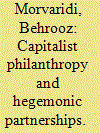

|
|
|
|
|
| Publication |
2012.
|
| Summary/Abstract |
Over the past 10 years individual capitalists have become increasingly involved in philanthropy, setting up charitable foundations targeted at helping to reduce social problems such as poverty, disease and food security. This form of neoliberal capitalist philanthropy is both politically and ideologically committed to market-based social investment through partnerships, to make the market work or work better for capital. The new structures of philanthropy have received much praise in the media for imbuing capitalist business principles into the non-profit sector and for their potential for social transformation. While philanthropic activities may be considered worthy in themselves, this article examines the relationship between giving and business interest and the agency associated with neoliberal capitalist philanthropy. It questions partnerships between philanthropists and private corporations and their motivations for engaging in poverty-related philanthropy. The discussion focuses on capitalist philanthropic foundations' involvement in the process of agricultural commodification in sub-Saharan Africa through the New Green Revolution and genetically modified (gm) technologies.
|
|
|
|
|
|
|
|
|
|
|
|
|
|
|
|
| 2 |
ID:
116872
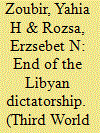

|
|
|
|
|
| Publication |
2012.
|
| Summary/Abstract |
The 42-year dictatorship in Libya finally collapsed in October 2011; it took the Western-backed armed uprising seven months of intensive fighting to defeat Qaddafi's loyalist forces. The fall of the Qaddafi regime is a welcome development in the Middle East and North Africa region. But, unlike Tunisia or Egypt, Libya does not have a standing army or a reliable potential force that can bring the necessary stability for a political transition. The tribal nature of the country and the difficulty of disarming the rebels and other groups pose serious challenges to the new authorities in Tripoli. Unless these issues are handled effectively, Libya will undergo a long period of unpredictability.
|
|
|
|
|
|
|
|
|
|
|
|
|
|
|
|
| 3 |
ID:
116874


|
|
|
|
|
| Publication |
2012.
|
| Summary/Abstract |
In the past three decades, citizen participation has been heralded as the hallmark of democracy and economic transparency. Yet citizen participation has not been limited to political and economic processes. In this paper I consider the incorporation of participatory measures in an arena frequently overlooked: security provision. I trace the origins, evolution and effects of efforts to increase citizen participation in security provision in Colombia. Despite notorious images of paramilitary forces, guerrilla insurgents and vigilante groups, citizen participation in security provision tends to be banal, boring and not particularly effective, as average people attend local meetings, work through state bureaucracy, and comply with new policy initiatives. I argue that insecurity in Colombia is neither a product of apathetic citizens nor of violent, uncontrollable mobs, but rather part and parcel of an emerging form of governance in which citizens are made responsible for their own security provision.
|
|
|
|
|
|
|
|
|
|
|
|
|
|
|
|
| 4 |
ID:
116873


|
|
|
|
|
| Publication |
2012.
|
| Summary/Abstract |
Relative social and economic well-being in the aftermath of a state's collapse is usually explained on the basis of a single case, Somalia, and with reference to the impact of endogenous factors such as the repressive and predatory nature of the state which collapsed and the ability of civil society actors and institutions to fulfil those functions that are normally performed by a state. This article challenges this theoretical view. As can be seen from a study of Lebanon, relative well-being after state collapse is more common than it appears to be at first glance. Moreover, given the limited role that the Lebanese state played in the economic and political spheres before the breakdown of state authority in 1975, the repressive and predatory nature of the collapsed state cannot be the explanatory variable in this case. Exogenous factors, such as remittances from abroad, international loans bestowed upon residual state institutions and 'political money' from foreign powers, are the decisive factors generating such paradoxical developments. Study of Somalia and Lebanon also shows the limitations of the conceptualisations of state collapse prevalent in the literature.
|
|
|
|
|
|
|
|
|
|
|
|
|
|
|
|
| 5 |
ID:
116875
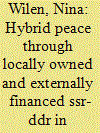

|
|
|
|
|
| Publication |
2012.
|
| Summary/Abstract |
This article aims to critically examine Rwanda's security sector reform and disarmament, demobilisation and reintegration (ssr-ddr) process through a theoretical framework outlining four different models of peace processes in order to identify the sort of peace that can emerge from Rwanda's ssr-ddr approach. The author analyses how the Rwandan government has managed to keep the process 'locally' owned, while largely financed by external actors, despite strong criticism of its apparent lack of democratisation. The 'genocide credit', the Rwandan government's preference for national, rather than international solutions and its recent troop contribution to peacebuilding operations in the region are identified as the main reasons for this development. The paper argues that the peace emanating from the ssr-ddr process may be considered a hybrid form of state formation and state building, because of the local agency's preference for security and stability while simultaneously enjoying financial and technocratic support for its 'liberal' peacebuilding actions in the region.
|
|
|
|
|
|
|
|
|
|
|
|
|
|
|
|
| 6 |
ID:
116876


|
|
|
|
|
| Publication |
2012.
|
| Summary/Abstract |
Economic relations between China and Latin America have grown rapidly over the past decade. This paper documents the growth of trade, foreign direct investment (fdi) and other financial flows between China and Latin America and identifies the interests of China in the region as a source of raw materials, a market for exports of manufactured goods and an area of diplomatic competition with Taiwan. It points to the asymmetric nature of the relationship in terms of the relative importance of bilateral trade to each partner, the composition of trade flows, and the balance of fdi flows. It shows that these show many of the characteristics of centre-periphery relations. However, China is far from becoming a new hegemonic power in Latin America and the latter's relations with the USA and Europe continue to be more significant than those with China.
|
|
|
|
|
|
|
|
|
|
|
|
|
|
|
|
| 7 |
ID:
116871
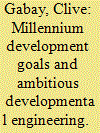

|
|
|
|
|
| Publication |
2012.
|
| Summary/Abstract |
Donor governments have been accused of not doing enough to achieve the Millennium Development Goals (mdgs), while the mdgs have been accused from other quarters of not doing enough for development. The former position takes the mdgs as an unquestionable good, while the latter posits them as a Western ruse for the sedimentation of core-periphery relations. This paper transcends this debate, identifying in the goals a logic of ambitious social, cultural and spatial engineering. Inspired by Foucauldian development anthropology, the paper highlights three themes implicit in mdg texts, requiring biopolitical interventions on bodies, societies and spaces, namely risk, sex, gender and family; Homo Economicus; and the city. The paper concludes with a reflection on the likelihood of resistance to such interventions.
|
|
|
|
|
|
|
|
|
|
|
|
|
|
|
|
| 8 |
ID:
116879


|
|
|
|
|
| Publication |
2012.
|
| Summary/Abstract |
This essay revisits Marshall Berman's extremely influential book, All that is Solid Melts into Air, some thirty years after its first publication. Berman provided an analysis of modernity as something including, but not limited to, capitalism, and as something which encompassed not just `social processes' but also new subjectivities, not just new world(s) but new ways of inhabiting them. He also offered a passionate defense of modernity an its possibilities, and of modernism as a mode of engaging and affirming these possibilities. In asking how well this analysis reads 30 years later, this essay provides a sympathetic critique, in the course of which it provides elements of an alternative, postcolonial reading of modernity.
|
|
|
|
|
|
|
|
|
|
|
|
|
|
|
|
| 9 |
ID:
116869
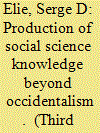

|
|
|
|
|
| Publication |
2012.
|
| Summary/Abstract |
This article makes the case for a post-exotic anthropology as an alternative disciplinary practice adapted to the emerging historical conjuncture that is reconfiguring the political and epistemic relations between different parts of the world. This is raising anew a legitimation challenge to mainstream social sciences but especially academic anthropology, as its a practice is still characterised by a chronic exoticist inflection thanks to its allegiance to the epistemology of Occidentalism. The article calls for a revision of anthropology's geo-theoretical premises in light of an emergent post-exotic historical conjuncture, which entails the abandonment of the duopoly exercised by the epistemic regimes of postmodernism and postcolonialism, in favour of a post-exotic standpoint. It suggests the adoption of mesography as the optimum means of operationalising a post-exotic anthropology as well as an alternative mode of social science knowledge production. Finally, it proposes an ethic of reciprocity to rectify the extractive fieldwork practices that sustain the illiberal politics of interpretation of academic anthropology.
|
|
|
|
|
|
|
|
|
|
|
|
|
|
|
|
| 10 |
ID:
116878
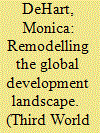

|
|
|
|
|
| Publication |
2012.
|
| Summary/Abstract |
China's explosive growth and growing international influence have prompted policy makers and scholars to question how that country will reshape the global development landscape. While Western observers have used the concept of the China Model to describe China's development strategies and the potential threat they pose to Western liberal traditions, Chinese policy makers have promoted South-South cooperation to emphasise China's goal of a harmonious world order based on nation-state sovereignty and mutual benefits. This article explores these two competing organising principles with a focus on how each concept frames global development politics and China's relations with its development partners. Drawing on ethnographic research on China's new relationship with Costa Rica, I examine the assumptions and effects of these concepts in terms of how they shape specific development encounters. These examples suggest the intransigence of historical development inequalities and identities, which both support and limit China's global impact in significant ways.
|
|
|
|
|
|
|
|
|
|
|
|
|
|
|
|
| 11 |
ID:
116870
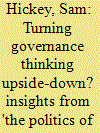

|
|
|
|
|
| Publication |
2012.
|
| Summary/Abstract |
Mainstream thinking within international development around what constitutes 'pro-poor' forms of politics is increasingly at odds with the growing evidence-base on the politics of development. Ideological bias towards Weberian modes of governance and rational actor models of political behaviour, and a growing belief in the power of 'evidence-based policy making' fail to reflect the extent to which informal and patronage-based forms can sometimes play a positive role in enabling poverty reduction, as well as the fact that political elites respond to a wider range of incentives than commonly assumed, including a role for political ideology and discourse rather than evidence per se. These findings offer further support for a fundamental rethinking around the role of politics in shaping development.
|
|
|
|
|
|
|
|
|
|
|
|
|
|
|
|
| 12 |
ID:
116866
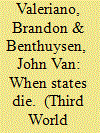

|
|
|
|
|
| Publication |
2012.
|
| Summary/Abstract |
State death, understood as the formal loss of control over foreign policy, is an important but neglected issue in the international relations literature. When do states die and why? How do states exit the system? The consequences of state death can be wide-ranging, from forced migration movements, regional instability, to general famine. Despite these severe consequences, political scientists have yet to adequately study the causes of state death. Fazal finds that states are prone to death when they are located as a buffer between two rivals; this suggests that being a buffer state is a cause of state death. Our expansion of current research seeks to add the concept of territorial disputes to the state death literature. We suggest that states are at greater risk of death when they become involved in territorial disputes that raise the stakes of conflict. The resulting research demonstrates that a reliable predictor of state death is engagement in a territorial dispute. Territorial disputes are the most prevalent issue that leads to war and can also be a leading cause of state death.
|
|
|
|
|
|
|
|
|
|
|
|
|
|
|
|
|
|
|
|
|